- Home
- Catherine Anderson
Silver Thaw Page 2
Silver Thaw Read online
Page 2
“If I ever meet the right woman, she’ll take one look at you and run screaming in the other direction. You know that, right?”
Bozo growled—his way of talking. Grinning, Jeb resumed reading the notes. My only weapons are a cast-iron skillet and a butcher knife hidden under my mattress so my daughter won’t find it. If my husband tracks us down, I pray that God will give me the strength to knock him out with the frying pan. I will die before I let him hurt my baby again.
Bozo let loose with another fart. Flatulence was a trait of the mastiff that Jeb had overlooked when deciding on a breed. Waving a hand in front of his face, he wished he could lend this poor lady his dog, not to torture her with the less-than-aromatic delights, but for security. With Bozo on guard, she wouldn’t need a heavy skillet for protection.
Jeb turned his attention to the next note. Damn, he thought. This could become addictive. He felt as if he were peering into someone’s heart. This lady clearly had an abusive bastard for a husband, was as close to flat broke as a person could get, and, to top it all off, had a little girl she could barely support.
Jeb wondered once again if she was targeting his land with her notes. He thought of his cantankerous old neighbor across the road. Tony Bradley, who farmed full-time for a living, had a heart of gold that he tried hard to hide. Time to take a stroll. If Tony had found pink slips of paper on his land, then Jeb could relax. Jeb didn’t like the idea that some desperate female had set her sights on him. Even if she had no car, she could walk by his land if she lived nearby.
Bozo went with Jeb to Tony’s place. Mastiffs needed plenty of exercise, at least a thirty-minute walk each day, which Bozo got by following Jeb around as he tended to his livestock. Extra walking never hurt—although he tried to make sure his mastiff seldom ran. That was bad for the joints and hips of a dog that weighed two hundred and thirty pounds; also, mastiffs could easily become overheated, even in cold weather.
With the crops all harvested, old Tony was in “winter” mode, when he repaired his equipment, fed his animals, watched TV, and worked crossword puzzles. Jeb found him tinkering with his tractor, an ancient John Deere that had lost nearly all its identifying green and yellow paint and was probably worth more as an antique than Tony’s whole farm was.
“Hey, Tony!” Jeb called out. “Got tractor problems?”
The old man resembled a stout stump with a two-day growth of whiskers and was dressed in tan Carhartt outerwear smudged with grease. He cast a cranky glare at Jeb. “Betsy never has problems. Kind of like a woman, son. All she needs is a little lovin’ to keep her motor tuned.”
Jeb drew to a stop near a front tire that was taller than his hip. Bozo chose that moment to shake his head and send drool flying. Just then, Mike, Tony’s red tri Australian shepherd, bounded out from under the tractor. The two canines sauntered off to take turns pissing on every bush in sight.
“What brings you over?” Tony wiped his hands on a rag so greasy that it only smeared more oil onto his fingers. “If you haven’t found a new cleaning lady and you’re wantin’ to hire my wife, you’re out of luck. Mike sheds like a son bitch and I’m sloppy, so we keep Myrna pretty busy.”
Jeb hadn’t started looking for a new cleaning person since his last one had quit. “I’m between jobs right now.” Jeb saw no need to elaborate. He and Tony had been neighbors long enough that the old man understood his on-and-off-again work schedule. Jeb had just finished a furniture order from a man who’d wanted a special Christmas gift for his wife, but otherwise it had been a slow season. “I figure I can muck out the house myself for a while. When the building market picks back up in February or March, I’ll send out some feelers.” He winked. “And I promise not to steal Myrna.”
Tony, a tobacco chewer, leaned sideways to spit. “Good thing. She’s got a hip goin’ out on her, I’m afraid. Hurtin’ her off and on.”
Jeb hated to hear that. Myrna was a sweet gal and only sixty-three, a bit young to need a hip replacement. “I hope she gets to feeling better soon. A couple of months back, my mom hobbled around from pain in her hip.” Kate Sterling’s version of hobbling was to limp at a fast pace. “She was about to see Doc Hamilton when the discomfort went away.”
“I see his partner, Dr. Payne.” Tony chuckled. “Signed on with him out of curiosity. If I was a young doctor with a last name that sounds like pain, I’d get it changed.”
“He may be young, but I’ve heard he’s good,” Jeb observed. “Maybe you should take Myrna to see him.”
“Damned woman won’t go. She’s too stubborn by half, my Myrna.”
Not sure what to say, Jeb whacked the frozen ground with the heel of his boot. Tony worshiped his wife and didn’t share personal stuff unless he was truly troubled.
“So what brings you over?” Tony asked.
Jeb fished a handful of pink strips from his coat pocket and extended the crinkled lump. “Just wondering if you’ve found any of these on your land.”
Tony squinted. “Son bitch. You gettin’ those, too? Got my Myrna in a tailspin, I’ll tell ya. She drives me half nuts tryin’ to figure out who’s writin’ ’em. Has me lickin’ my finger to test the wind direction.”
Jeb stuffed the notes back in his pocket. “I didn’t consider the possibility that they floated into my place on the wind. How many have you and Myrna found?”
“A good twenty.” Tony spat again, narrowly missing Bozo, who’d come to lie at Jeb’s feet. “I got my theories on it, if you don’t mind me sharin’. The writer is a female, and she’s lonely. Has no friends. Works as a cook somewhere and makes barely enough to scrape by. Also yearnin’ to find herself a man. In one message, she wished for Prince Charming to carry her and her child away on a white steed to live happily ever after.”
“Really.” Jeb recalled the note about the woman’s wish to find a hero. “She must be having a hard time of it.”
“And she’s probably uglier than a fence post if she’s that desperate.”
Jeb thought about it and decided Tony might be right. A beautiful woman didn’t normally have to search for a man to rescue her. Men stood in line to apply for the job. Not that Jeb cared if this gal was homely. She clearly needed a friend. He tried and failed to imagine having nobody to talk to. He’d grown up in Mystic Creek and couldn’t go into town without seeing someone he knew. He also had heaps of family here.
“Well,” he said, “I’m glad to hear the notes aren’t landing only on my property.”
Tony laughed. “You’re safe. I haven’t asked our neighbors if they’ve found any, but you can rest assured, as many as we’ve gotten, you aren’t bein’ singled out.”
Jeb studied the clouds. “Looks like snow tonight.”
Tony nodded. “Myrna says there’s a bastard storm front moving toward us.”
Jeb ended the conversation the way he and Tony always did, by walking away. He and Tony said only what needed to be said. Polite farewells weren’t part of their repertoire.
* * *
Bozo lumbered alongside Jeb’s left flank. Three rounds of obedience training had paid off. Well, mostly. Sometimes Jeb got the impression that Bozo believed the obedience classes had been for Jeb. Nevertheless, the dog had good manners and mostly did as he was told. That was a good thing. Mastiffs could be difficult if not properly raised.
When you owned a mastiff, being in control was important. Bozo was gentle and well socialized, so his protective nature rarely showed itself. Early on, Jeb had made the mistake of leaving Bozo at home while he was out on a job, and the dog had eaten his sheep shed. Jeb had come home to half-consumed planks and a collapsed roof lying willy-nilly on the ground. Marble, his Lincoln ewe, had stood in her pen baaing because her shelter was gone. Now Jeb rarely left Bozo alone. He was afraid his house might be targeted next. Bozo wasn’t a bad dog, but he could be destructive when he got lonesome.
Lonesome. Jeb stopped in front of his
log-and-timber ranch home and gazed off in all directions. Somewhere out there, probably within pitching distance, a very lonely woman was writing messages and tossing them into the wind. The thought bothered Jeb. He didn’t care if she was the homeliest female who’d ever breathed—if she needed a friend, he’d happily apply for the job. Nobody deserved to be so unhappy.
As he climbed the inlaid paver steps leading to the front door, he glimpsed yet another pink slip tangled in a holly bush. Curiosity got the better of him. What did she have to say this time? He pricked his thumb retrieving the note. Sucking on the injured digit, he read the damp missive. I wish I had a friend. I’d make chocolate chip cookies, my favorite, and hot chocolate, and we’d sit at my table to talk. I need to talk. Nobody special required. I just need to have a conversation with another adult. I see people at work, but that isn’t the same.
Jeb turned to gaze into the distance once again. Where are you, lady? The wind in this country gusted in all directions, coming in from the south during the late afternoon and evening. The sudden shifts made message tracking an inexact science. Huckleberry Road, where he lived, ran parallel to Bearberry Loop and Elderberry Lane, where most of the residences sat on one-acre parcels. Why Elderberry was called a lane, Jeb didn’t know. It was nothing more than a dirt road that never got plowed or graded unless a neighbor took the initiative.
Once inside, Jeb sent his baseball cap sailing toward his handcrafted juniper coat tree. Missed by a foot. Tomorrow he’d have to dust the hat off because it’d be covered with dog hair. Contrary to what he had implied to Tony, he wasn’t keeping up with the cleaning as well as he’d like. He was fussy about his house. Thanks, Mom. Kate Sterling was a meticulous housekeeper, and she’d passed on at least some of her obsessions to every kid. Jeb had inherited the kitchen and bathroom manias; he had to have a sterile place to cook and to brush his teeth. Now the rest of the house was going to hell, and that was starting to bug him, too. Cleaning spree tomorrow, he decided. He’d knock it out in about four hours and be good for another couple of weeks, if he could teach Bozo to stop shedding.
“Fat chance of that.” He reached down to pat his dog’s head. “That lady needs a dog to talk to. You’re all the company I need.”
But as Jeb prepared dinner—he loved to cook—he had to admit that as great a listener as Bozo was, Jeb rarely went a day without talking to other adults. His mom called daily. His two sisters, real chatterboxes, bugged him about three times a week. His three brothers called fairly often—even Jonas, who was away at college. And, of course, his dad, Jeremiah, rang him occasionally.
Guy conversations were simple, no chitchat required. How you doing? Good. Just calling to check in. All’s fine on my front. How about you? I’m fine. After that, the call usually ended with, “Love ya.” Jeb appreciated the brevity. That wasn’t the case with his mother and sisters, who had to fill him in on friends, gossip about a neighbor, or a great sale at Macy’s in Bend. He hadn’t minded the time Sarah had called him crying because her hair was striped with green. Jeb had found that interesting, a dye job and weave gone bad. What the hell was a weave, anyway? And why did Sarah, who had perfectly nice hair the same toffee color as his, feel a need to streak it with different shades of blond or red that could come out the wrong color? Jeb preferred to go with what God had given him.
Jeb began chopping vegetables for a stir-fry. He tossed chunks of raw carrot, celery, broccoli, and cauliflower over his shoulder to Bozo, keeping the onions and garlic for himself. Bad stuff for dogs. Something about causing their bone marrow to stop producing red blood cells.
Behind him, he heard Bozo gnawing on the safe stuff. Dinner preparation was their time. He’d been feeding the dog vegetables since he was a pup, and he’d become a greenie gobble gut. Not a bad thing, according to the vet. Jeb made a quick pot of rice in his electric pressure cooker, whipped up some broth gravy, and took a seat at the round kitchen table to devour his meal while Bozo crunched on his evening kibble.
Afterward, Jeb tidied up the kitchen and sat back down at the table with a measure of brandy to have a long discourse with Bozo about the mysterious writer of the pink slips. In between Jeb’s sentences, Bozo growled, his way of replying. Jeb followed the rules of polite exchange and didn’t speak until Bozo had had his say.
Their conversation ended when Jeb finished his brandy. As he and Bozo sauntered toward the downstairs master suite, Jeb said, “That poor woman needs a mastiff like you, one who talks. We’ve had a perfectly fine conversation.”
* * *
I’m dreaming. It’s just a dream, Amanda told herself, only no matter how she tried to wake up, she couldn’t. Mark. He’d locked his arm around her throat and held a partially loaded revolver to her temple as he described how her brains would look splattered all over the wall. The pressure against her larynx prevented her from speaking. All she could do was moan, quiver with terror, and pray the chamber would be empty when he pulled the trigger.
Click. The sound snapped Amanda to a sitting position in bed. The sheet was tangled around her legs. Her breath came in wheezy jerks. Perspiration ran in rivulets over her ribs. Even awake, she could still feel the strangling sensation in her throat. Oh, God, oh, God. She jerked at the bedding to free herself and staggered to the bathroom to empty her bladder. Not real. Only a dream. But telling herself that didn’t help her to stop shaking. Too weak to stand, she remained on the commode until the nightmare released its hold on her.
The house seemed oddly bright as she left the bathroom. She went to a living room window, drew back the curtain, and saw at least a foot of snow outside. Though her heart sank, she had to admit it was beautiful. The never-used mailbox, mounted on a post at the edge of the front yard, looked like a loaf cake topped with fluffy white icing. Because she lived at the end of Elderberry Lane, a dead-end road, no cars had passed, leaving the carpet of snow undisturbed. In places it lay in powdery drifts. The boughs of the pine trees drooped under the weight. It was a winter wonderland.
If only she could stay inside and admire it. She turned up the thermostat to take the chill off before she woke Chloe for school. Half of the old baseboard heaters didn’t work, and twenty minutes later, the house still felt cold. Chloe was tiny and thin. Amanda hated to expose her to icy drafts. Somehow she would keep the child wrapped in a blanket while she got her dressed. Otherwise Chloe’s teeth would chatter as she ate her oatmeal and a roll that Amanda had brought home yesterday from Chloe’s school cafeteria, where she worked. Job perk. At the end of each shift, Delores, the head cook, allowed her helpers to divide the leftovers. According to her, some law made it illegal to feed the kids day-old food. The portions Amanda received weren’t haute cuisine, but they reduced her grocery bill each month, enabling her to make ends meet. Well, almost. The cost of electricity this month might break her.
As grim as their situation was, Amanda shoved away her memories of the nightmare and felt peace settle into her heart. At least Mark wasn’t a part of this snowy picture. No angry outbursts, no blows, no furniture being thrown, no holes in the walls. As icky as the weather might be, Chloe would feel safe while they ate breakfast.
Amanda walked to her daughter’s tiny bedroom, which she’d painted avocado, using what Landon Ramsey, the young owner of Sticks and Stones Building Supply, called a “residual” color. In regular-speak, that meant he’d mixed it for a customer who’d changed her mind and refused to purchase it. Amanda had figured she couldn’t go wrong at five dollars a gallon—at least Chloe’s room got clean walls. Amanda had decorated the room with thrift-store chic, buying curtains, a cute bedspread, and old throw rugs to cover the worn linoleum.
It wasn’t a little girl’s dream, but Chloe loved having her own bookshelf, purchased for a song at Second Time Around. The proprietor, a cute brunette with green eyes named Tally Tancy, didn’t look old enough to operate a business, but her store, which offered large and small used appliances, plus furniture, seemed t
o be thriving. Tally delivered anywhere in town for twenty dollars, always accompanied by her Rottweiler mix, Nita, who went everywhere with a fresh knucklebone clamped between her teeth. Though rickety and banged up, Chloe’s bookshelf had been dropped off for free, and it was now filled with books that had cost only a quarter apiece.
Flipping on the clown lamp on her daughter’s bedside table, Amanda leaned over to say, “Surprise, surprise, sweetheart. It snowed last night!”
Chloe blinked open her chocolate brown eyes, so very like Amanda’s own. With a squeal of delight, she scrambled from bed to peer out her ice-encrusted window. Amanda grabbed a blanket and draped it around the child’s shoulders.
“Isn’t it pretty?” she asked.
Chloe nodded. Then she frowned. “We still don’t have snow boots, Mommy. Our feet will get wet walking to the bus stop.”
“Nope! Remember those bread sacks I’ve been saving? They’ll keep your feet dry.”
Chloe shoved a hank of curly hair out of her eyes. “But, Mommy, nobody at school wears bread sacks for boots. My friends will laugh at me.”
“Got it covered.” Amanda gave the child a hug. “When we get to the bus stop, I’ll walk around to flatten the snow, and you can take the sacks off before the bus comes.”
Chloe reached up to touch Amanda’s cheek. “Are you going to wear bread sacks while you walk to work?”
Amanda suspected that she’d slip and fall if she tried, but she would wear them as far as the bus stop so Chloe wouldn’t worry all day about her mother wearing wet running shoes. “Absolutely! Maybe I’ll start a new fashion fad.”
Chloe giggled. Amanda left her to admire the snow while she gathered her daughter’s clothing. Then, working as quickly as possible, she helped her get dressed. Thanks to Mystic’s Good as New and the Vintage Boutique, the child had nice, warm outfits, and this coming Saturday, Amanda would walk with Chloe to town and buy her some snow boots at Charlie’s Sporting Goods, whether she could afford them or not.

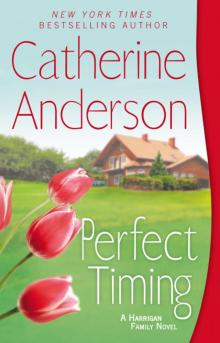 Perfect Timing
Perfect Timing New Leaf
New Leaf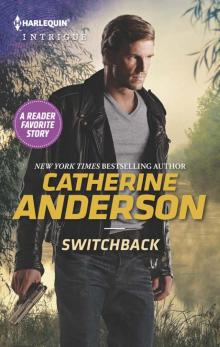 Switchback
Switchback Phantom Waltz
Phantom Waltz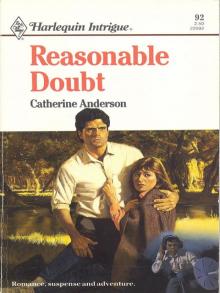 Resonable Doubt
Resonable Doubt Comanche Heart
Comanche Heart Sweet Nothings
Sweet Nothings Sun Kissed
Sun Kissed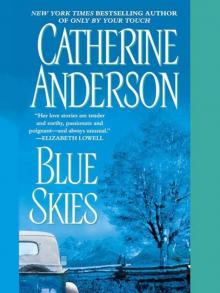 Blue Skies
Blue Skies Mulberry Moon
Mulberry Moon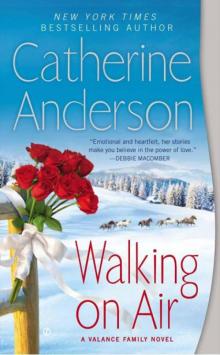 Walking on Air
Walking on Air Forever After
Forever After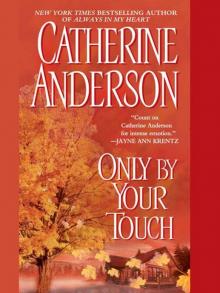 Only by Your Touch
Only by Your Touch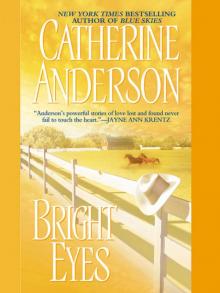 Bright Eyes
Bright Eyes Morning Light
Morning Light Indigo Blue
Indigo Blue Fancy Free (Three Times a Bride Anthology)
Fancy Free (Three Times a Bride Anthology) Cry of the Wild
Cry of the Wild Here to Stay
Here to Stay Star Bright
Star Bright The Christmas Room
The Christmas Room Coming Up Roses
Coming Up Roses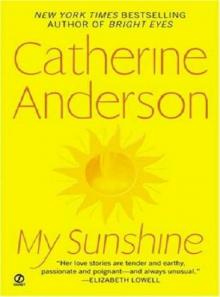 My Sunshine
My Sunshine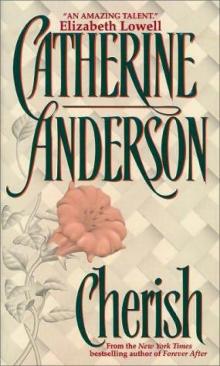 Cherish
Cherish Strawberry Hill
Strawberry Hill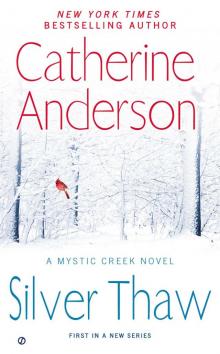 Silver Thaw
Silver Thaw Comanche Moon
Comanche Moon Spring Forward
Spring Forward Lucky Penny
Lucky Penny Early Dawn
Early Dawn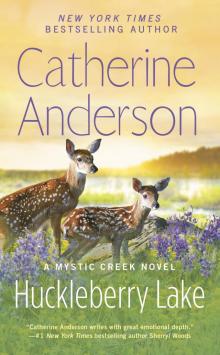 Huckleberry Lake
Huckleberry Lake Summer Breeze
Summer Breeze Without a Trace
Without a Trace Three Times a Bride
Three Times a Bride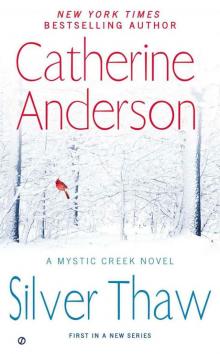 Silver Thaw: A Mystic Creek Novel
Silver Thaw: A Mystic Creek Novel